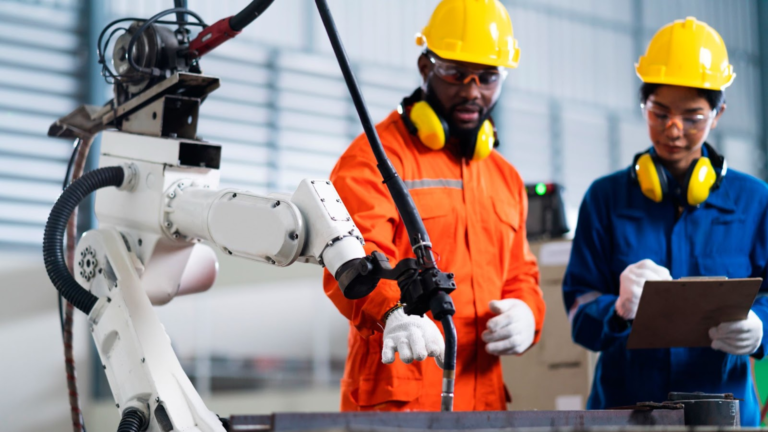The industrial landscape is experiencing a seismic shift with the advent of Industry 4.0, also known as the Fourth Industrial Revolution. This paradigm marks a significant leap from traditional manufacturing practices to a fully integrated, automated, and data-driven industrial environment. But what exactly does Industry 4.0 entail, and how is it reshaping the future of manufacturing? Let’s delve into the core aspects of this transformative era.
Understanding Industry 4.0
Industry 4.0 is the convergence of several cutting-edge technologies, creating a smart factory environment where cyber-physical systems monitor physical processes, create virtual copies of the physical world, and make decentralized decisions. This integration is primarily driven by advancements in the Internet of Things (IoT), artificial intelligence (AI), big data analytics, cloud computing, and robotics. These technologies work in synergy to enhance productivity, efficiency, and flexibility in manufacturing processes.
Key Components of Industry 4.0
1. Internet of Things (IoT): IoT refers to the network of interconnected devices that communicate and exchange data in real-time. In the context of Industry 4.0, IoT enables machines, sensors, and systems to interact seamlessly, providing valuable insights into operational performance and enabling predictive maintenance.
2. Artificial Intelligence (AI) and Machine Learning (ML): AI and ML algorithms analyze vast amounts of data to identify patterns, optimize processes, and predict outcomes. These technologies are crucial for developing smart manufacturing systems that can learn and adapt to changing conditions autonomously.
3. Big Data Analytics: The ability to process and analyze large datasets is fundamental to Industry 4.0. Big data analytics allows manufacturers to gain deep insights into their operations, improve decision-making, and identify opportunities for innovation and efficiency.
4. Cloud Computing: Cloud platforms provide the infrastructure needed to store and process data on a large scale. They enable manufacturers to access computing resources on-demand, facilitating collaboration and data sharing across the supply chain.
5. Robotics and Automation: Advanced robotics and automation technologies enhance precision, speed, and consistency in manufacturing processes. Collaborative robots (cobots) work alongside human operators, improving productivity and reducing the risk of errors.
Benefits of Industry 4.0
The implementation of Industry 4.0 technologies offers numerous benefits for manufacturers:
– Increased Efficiency: Automation and real-time data analytics streamline operations, reduce downtime, and enhance resource utilization.
– Improved Quality: Advanced monitoring and control systems ensure higher quality standards and reduce the incidence of defects.
– Cost Savings: Predictive maintenance and optimized resource management lead to significant cost reductions in maintenance and production.
– Flexibility and Customization: Smart factories can quickly adapt to changes in demand, enabling mass customization and reducing time-to-market.
– Enhanced Supply Chain Management: Real-time visibility into supply chain operations improves coordination, reduces lead times, and enhances overall supply chain resilience.
Challenges and Considerations
While Industry 4.0 presents immense opportunities, it also poses several challenges that manufacturers must address:
– Cybersecurity: The increased connectivity of devices and systems heightens the risk of cyber-attacks. Robust cybersecurity measures are essential to protect sensitive data and ensure operational continuity.
– Workforce Transformation: The shift towards automation and AI necessitates a skilled workforce capable of managing and leveraging these technologies. Continuous training and upskilling are vital to address the skills gap.
– Integration Complexity: Integrating new technologies with legacy systems can be complex and costly. Manufacturers need a clear strategy for seamless integration to realize the full potential of Industry 4.0.
– Investment Costs: The initial investment in Industry 4.0 technologies can be substantial. However, the long-term benefits and return on investment (ROI) justify these upfront costs for many organizations.
The Future of Manufacturing
Industry 4.0 is not merely a trend but a fundamental transformation of the manufacturing sector. As technologies continue to evolve, the capabilities of smart factories will expand, further blurring the lines between the physical and digital worlds. Manufacturers that embrace this revolution stand to gain a significant competitive advantage, driving innovation, efficiency, and growth in the digital age.
In conclusion, Industry 4.0 represents the next frontier in industrial advancement. By harnessing the power of IoT, AI, big data, cloud computing, and robotics, manufacturers can unlock unprecedented levels of efficiency, quality, and customization. As we move forward, the successful adoption of Industry 4.0 technologies will be crucial for staying competitive in an increasingly complex and dynamic global market.




